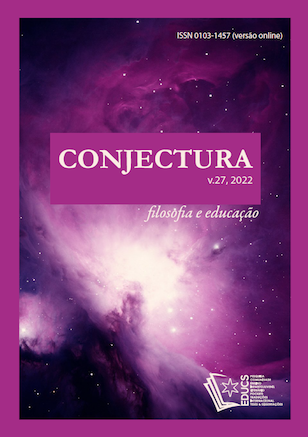Education for humanization from the perspective of the ethics of alterity
DOI:
https://doi.org/10.18226/21784612.v27.e022021Abstract
One of the issues that challenges educators involved in teaching and learning processes is the role of Education from the point of view of life in society. And a generally accepted answer points to the dimension of humanization. The question is: To what extent does the educational relationship have the capacity and potential to humanize? How to relate the construction of knowledge to the valuation perspective that promotes human sociability? Based on these questions, this text aims to reflect on Education from the perspective of the ethics of alterity as one of the viable alternatives for the humanization process. This is a bibliographical research, based on the works of Martin Buber (1974; 1987) and Paulo Freire (1979; 1983) as main theoretical references, considering the role of Education in facing this problem. From the readings, we understand the concept of alterity, which points to the path of demythologizing reality through this same dimension, which can be understood in the field of Education. We conclude that only from the perspective of the ethics of alterity, this relationship can be dialogic, and only then, this process can be transformative and liberating, an educational posture that enhances solidarity relationships and, consequently, humanizes in its fullest meaning of being with the other.
Keywords: Ethics. Education. Coloniality. Otherness.
References
BUBER, Martin. Eu e Tu. (Trad. Newton Aquiles Von Zuben). 2ª. ed., São Paulo: Ed. Moraes, 1974.
DUARTE, Newton. Sociedade do Conhecimento ou Sociedade das Ilusões? São Paulo: Ed. Autores Associados, 2003. (Col. Polêmicas do Nosso Tempo, nº. 86)
DUSSEL, Henrique. Ética da Libertação na idade da globalização. Petrópolis: Ed. Vozes, 2000 (Trad. Ephaim Ferreira Alves, Jaime A. Clasen, Lucia M. E. Orth)
FREIRE, Paulo. Pedagogia do Oprimido. 13ª. ed., Rio de Janeiro: Ed. Paz e Terra, 1983.
______. Conscientização: teoria e prática da libertação – uma introdução ao pensamento de Paulo Freire. 3. ed. São Paulo: Cortez Moraes, 1979.
GIRARD, René. A violência e o Sagrado. Trad. Martha Conceição Gambini. São Paulo, Ed. UNESP & Paz e Terra, 1990.
GOES, A. Pósfacio. In: Buber, M. Encontro: fragmentos autobiográficos. Petrópolis: Vozes. 1991.
LANDER, Edgardo (org.). A colonialidade do saber: eurocentrismo e ciências sociais. Buenos Aires: Consejo Latinoamericano de Ciencias Sociales – CLACSO, 2005.
LÉVINAS, Emmanuel. Entre Nós: Ensaio Sobre a Alteridade. Trad. Pergentino Stefano Pivatto. Rio de Janeiro, Ed. Vozes, 1991.
MIGNOLO, Walter D. O Lado Escuro da Colonialidade. In. Revista Brasileira de Ciências Sociais, Vol. 32, Nº 94. 2017.
PLATÃO. A República. Tradução Maria Helena da Rocha Pereira. 9. ed. Lisboa: Fundação Calouste Gulbbenkian, 2001.
QUIJANO, Aníbal. Colonialidad del Poder, Cultura y Conocimiento en América Latina. In: Anuário Mariateguiano. Lima: Amatua, v. 9, n. 9, 1997.
QUIJANO, Aníbal. Colonialidade do poder, eurocentrismo e América Latina. In: LANDER, Edgardo (org.). A colonialidade do saber: eurocentrismo e ciências sociais. Buenos Aires, Consejo Latinoamericano de Ciencias Sociales – CLACSO, 2005. p. 107-130.
SANTOS, Boaventura de Sousa. Epistemologia do sul. Coimbra: Ed. Almedina, 2009.
Downloads
Published
How to Cite
Issue
Section
License
1. The publication of the originals will imply the assignment of copyright to Conjectura Journal.
2. Texts cannot be reproduced without authorization from the Journal after acceptance.









